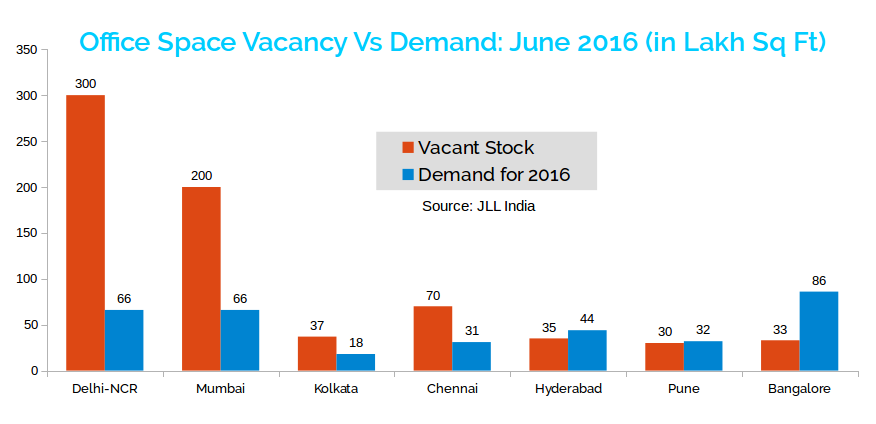Over 10 million square feet office space occupied in 2015; 2 million square feet office space in under-construction projects across the seven major Indian cities for offices.
Among the seven major office space markets in India, Bengaluru has the lowest vacancy levels. At slightly more than 3%, the office vacancy levels are at an all-time low in the information technology capital of India. It is followed by other IT hubs Pune and Hyderabad, having vacancy levels of 6% and 9%, respectively. Chennai comes next at around 12%, Kolkata and Mumbai around 19% and Delhi-NCR at almost 32% vacancy levels.

At a pan-India level, the average vacancy in commercial real estate stands at 15%, as of 2Q16. Looking at these figures, it is clear that IT hubs continue to see a good supply-demand equilibrium compared to some other markets in the country. For Bengaluru, it shows how occupier demand continues to remain strong as also how developers here have remained attuned to market dynamics so far. Any new supply that has been made available by them to the occupiers here has been taken up quickly by the latter.
The time to supply more quality space has, however, arrived and developers in Bengaluru need to look into addressing the existing space crunch. Some developers have rightly started advancing completion of their commercial projects in the city. Given the community’s reputation of having their ears to the ground, this trend is expected to be followed by other developers in the coming months.
In 2015, more than 10 mn sq ft of office space got occupied and another 2 mn sq ft of leasing was done in under-construction projects. In 1Q16, Bengaluru had seen the highest leasing volumes in Asia Pacific on the back of big-ticket transactions. Although there is demand for 10 mn sq ft, supply of only 8-8.5 mn sq ft non-captive office space is expected to come up by the end of 2016.
In terms of office stock, Bengaluru is a clear winner among these three IT-dominated markets. The stock (in mn sq ft) here is far more than the stock of Pune and Hyderabad put together. In terms of IT stock too, Bengaluru leads the way although when it comes to quality options for occupiers, all three cities are struggling equally.
While talent availability and the scale of its thriving IT ecosystem have been helping Bengaluru, there is a risk of the city losing its ‘numero uno’ position if the pace of infrastructure upgrade is unable to keep up with changing skyline. A wake-up call has come in the form of occupier demand shifting from Bengaluru’s established IT corridors to newer ones like the Northern corridor that have better infrastructure. This shows how important timely augmentation of infrastructure is, as without it, the demand moving within the city could move out altogether. The new signal-free corridors and metro routes planned become all the more important, therefore, and need to be completed within stipulated deadlines.
Author: Ashutosh Limaye, National Director – Research, JLL India. JLL is a global real estate consultancy firm offering specialized real estate services to clients seeking increased value by owning, occupying and investing in real estate.